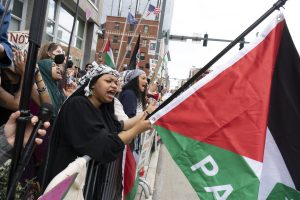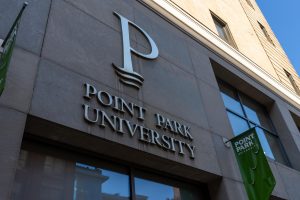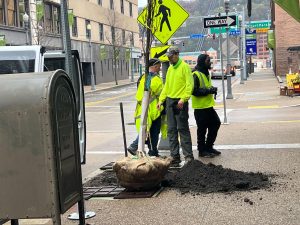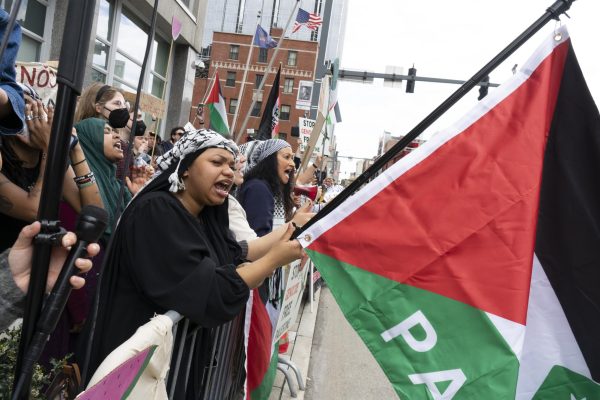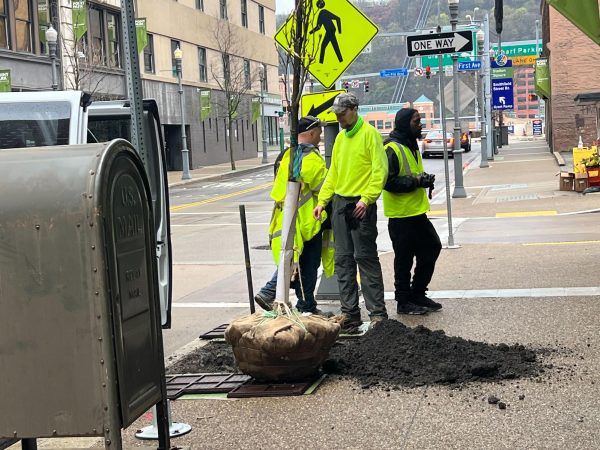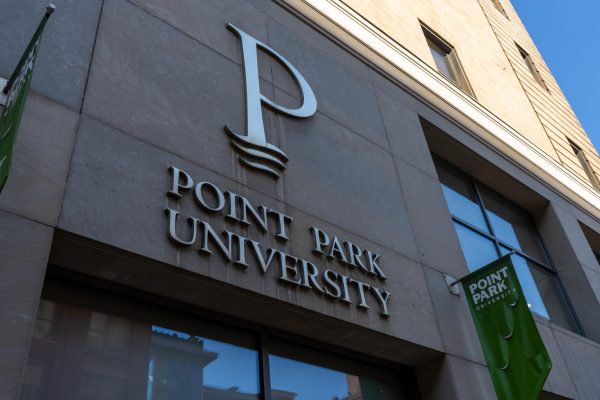Vigil held at the city council building in remembrance for Atlanta shooting victims
March 24, 2021
On Sunday, March 21 hundreds of people gathered for a candlelight vigil at the City-Council Building in Downtown Pittsburgh to remember and pay their respects to the eight victims, six of which were Asian and Asian American, killed last week in Atlanta in a series of mass shootings.
Multiple local leaders of Asian organizations and members of the Pittsburgh City Council spoke to their personal experiences as Asian Americans, and how race, gender and class played a role in the violence in Georgia and the rise of hate crimes perpetrated against Asians and Asian Americans within the last year during the pandemic.
“The violent deaths in Atlanta this week, disappointing official responses, these occurred because of the intersection of race, gender, the work that is available to different people in the U.S. and many more issues,” said the first speaker Anupama Jain, a city council staff member and the city’s Executive Director of Gender Equity Commission.
Jain continued, “They expose assumptions and attitudes about different people in the U.S. and the lack of awareness many, too many, Americans have about Asian lives in America. We as a country are starting again, to have a national dialogue about anti-Black racism, about trans lives, about too many vulnerable populations in the country. We have a long long road ahead of us to pave for racial and gender justice for all people.
A former city council staff member who serves on Gov. Tom Wolf’s Commission for Women, Itha Cao, spoke about the trauma connected to the Asian experience in America, specifically the pain the Asian American and Pacific Islander (AAPI) community felt in the past week.
“I stand before you today not as a suit with fancy government titles but as an Asian American who like many of my brothers and sisters this week have been replaying over and over in our heads a lifetime of trauma—from microaggressions, verbal and physical assaults,” Cao said.
According to analysis from official preliminary police data at the Center for the Study of Hate and Extremism at California State University at San Bernardino, Anti-Asian hate crime in 16 of America’s largest cities increased 149% in 2020 with the first increase occurring in March and April amid a rise in COVID-19 cases and anti-Asian rhetoric surrounding the virus and the pandemic from the Trump administration.
“Because of the color of our skin, the shape of our eyes, and the harmful, racist stereotypes that are perpetuated from white supremacy, our elders, our undocumented sisters and brothers, and our most vulnerable have been targeted and killed,” Cao said.
Cao finished her speech with a phrase in Mandarin addressing the AAPI community, “I see you. I hear you. I love you. May those that have fallen rest in peace.”
After the candles were lit and Cao recited the names of the Atlanta shooting victims, a poignant moment of silence followed.
The next speaker was a member of Pittsburgh United Chinese American (UCA) Sunny Yang.
“In less than one year nearly 3,800 hate incidents [were] reported against Asian Americans and many are unreported. So we are constantly on high alert the minute we leave our house. We worry we will be attacked on our way to work, that our parents will be robbed and killed on their morning walk and our children will be bullied on their way to school,” Cao said. “We are still overwhelmed by the feeling that we are unwelcome and unsafe in the very community we call home, simply because we are Asian.”
Following Yang’s speech was speaker Paris Yamamoto, a junior at the University of Pittsburgh studying Chinese and Linguistics and the only college-aged speaker of the evening.
“This year has been the most emotionally tasking and frustrating year of my 20-year-old life. Unfortunately, this week is the week I feel the most numb,” Yamamoto said.
Yamamoto said that though her anger and pain made it impossible to articulate her grief, she would try her best to express herself.
“To anyone who would call this hate crime the result of a bad day, please do not dismiss the lives of eight people, six of whom were East Asian women, as another statistic because of the fear that Asian women have been experiencing this week and throughout their lifetimes is not a statistic and [it] is more than a bad day,” Yamamoto said. “That fear is a result of the consistent hypersexualization and fetishization of Asian women in media, and make no mistake, it is dangerous and dehumanizing.”
Atlanta-area law enforcement officials have held off on labeling the shooting as a hate crime. Officers said the perpetrator blamed his sex addiction. But Asian American women, like Yamamoto and Judy Suh, a member of the Asian Pacific American Labor Alliance, said the sexualization of Asian women is directly connected to the racism and hate-fueled violence perpetrated against Asian women every day and specifically in this recent incident.
Judy Suh said that “for many of us, I know talking to a lot of AAPIs, it felt like a train wreck we could see coming like what happened this week and what’s been happening before [Atlanta shooting] as well.”
Suh said that the intersection between hypersexualization, fetishization and violence against Asian women has “its roots going back to European, especially British colonialism in Asia.”
“Most women regardless of race are familiar with the experience of their sexuality being objectified. I think what’s different with AAPI women’s experience is that we’re often completely equated with our sexuality, and because of the historical expectation of our submissiveness and meekness rooted in imperial history, that sexual objectification tends toward severe dehumanization,” Suh said. “Some men have been conditioned in racist cultures to use demeaning and violent means in line with these expectations, or when these expectations are defied.”
“We are not weak submissive objects to serve the pleasure of the male gaze. We are whole people. We are tired of living in fear,” Yamamoto said.
Moreover, religious leaders like Rabbi Ron Symons the Senior Direct of Jewish Life at the Pittsburgh Jewish Community Center said the community “must stand together in the face of hatred. Love your neighbor as yourself and do not stand idle as your neighbor bleeds.”
In the final moments of the vigil, Mayor Bill Peduto and County Executive Rich Fitzgerald said they stood in solidarity with the AAPI community and Pittsburgh is “no stranger to the type of racism, intolerance, the type of bigotry displayed in Georgia this week.”
The message of unity was cemented throughout the night and the crowd was left with a message of hope in this dark time from each speaker.
“This is how we create a future of peace and justice. We have to build trust, be in solidarity with one another. People of all identities from diverse experiences must not only survive but have genuine opportunities to thrive,” Jain said.




